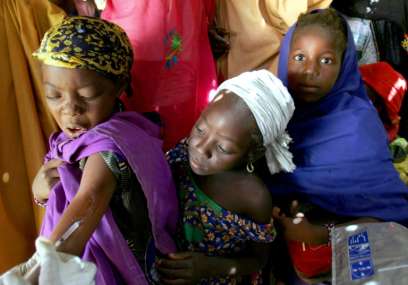Meningitis is caused by different types of bacteria, six of which can cause epidemics. It is transmitted between people by coughing and sneezing, close contact and cramped living conditions.
The illness causes acute inflammation of the outer layers of the brain and spinal cord, with the most common symptoms being fever, headache and neck stiffness. Niger's meningitis outbreak has been concentrated in the south and western parts of the country, but OCHA saw a drop in the number of cases beginning in April
Niger however has not been the worst affected African country this year. Last week, the Centre for Disease Control announced that Nigeria -- Niger's neighbour to the south -- had recorded a total of 13,420 suspected cases in 23 states with 1,069 deaths.
Both countries lie in the so-called "meningitis belt" of sub-Saharan Africa which stretches from Senegal in the west to Ethiopia in the east, where outbreaks of the disease are a regular occurrence.
Niger's outbreak has been concentrated in the south and western parts of the country, but OCHA saw a drop in the number of cases beginning in April. The town of Madarounfa, south of Maradi, is still experiencing an outbreak and Niamey remains on alert.
The UN, along with medical charity Doctors Without Borders (MSF) and other organisations, launched mass vaccination programmes in the affected areas, including Niamey.
Nigerien health minister Idi Illiassou Mainassara had said in April that Niger has enough medicine to treat up to 25,000 people. The country went through a similar outbreak between January and June last year, when health authorities recorded 573 deaths and more than 8,500 cases.
Source:Pulse Nigeria

 At least 179 people, almost half of them children, have died of meningitis since January in Niger, where some 3,000 suspected cases have been reported, the United Nations said Wednesday.
At least 179 people, almost half of them children, have died of meningitis since January in Niger, where some 3,000 suspected cases have been reported, the United Nations said Wednesday.




